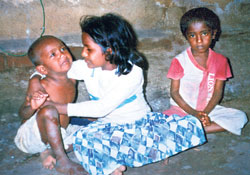The Colombo Municipal Council has informed the public that the city will soon have clean streets. The former fairytale-like city streets, those that inspired the squeaky-clean streets of Singapore, will once again inspire and cause amazement, rather than trigger nausea.
Strangely, these lofty, clean-city aspirations are announced only when an international or regional conference is due to be held in Colombo. For example, the 2008 SAARC conference caused much excitement. We worked overnight to sweep the dirt under our carpeted roads and clean up our act before rolling out the red carpet for our VIP foreign guests.
This letter is not about the streets of Colombo, however, but about the homeless children who live in the streets.
The street children problem has been highlighted recently in the media.
Street children are treated almost as non-citizens – nonentities at the mercy of the authorities. In the last couple of months a number of street children were bundled off and taken to courts and ordered to undergo rehabilitation.
The word “rehabilitation” is ambiguous and suggests policy planning without consideration of the psychosocial wellbeing of street people. Rehabilitation programmes are activated for different reasons: to “clear the roads” ahead of international conferences; for security reasons, and out of a genuine concern for street people.
However, the rehabilitation of street people can only be temporary because the streets are their home. They will eventually gravitate back to the streets, just like Dick Whittington and his cat.
The field work for my BA dissertation, “The motivation for children to live on the streets”, required that I spent time with a cross-section of street children, along with their parents. The children I focused on were based in Central Colombo. They all had one common complaint– that they were being constantly chased off the streets by the police and the authorities, and that they lived in fear and uncertainty.
Street children are regarded as a social disease that requires cleansing. But forcibly taking street children out of their familiar world of the pavements may be deemed a form of child abuse (Human Rights Watch: 1996). It is a sad fact that no one wants to fight for the rights of street children or opposes the injustices done to them.
Last year, street people in certain parts of Central Colombo were asked to vacate the area because they were living in “high security zones”. Street people are powerless when the police come to take them away.
The stereotypical argument is that moving street children into orphanages and homes is only for their own good. Institutionalisation is generally what a traditional welfare state does to miscreants, beggars, the mentally ill and those who do not contribute to a society’s production processes. Putting street children into homes is a completely different matter, and a cause for grave concern. Doing so only suggests that a state cannot handle problems of absolute poverty.
The presence of street children is an embarrassment to society and a blotch on a country’s image. However, is institutionalising them the best option? Aren’t there more attractive alternatives? Shouldn’t we be giving street children a vocational training and motivating them to do a job, rather than beg? How about a campaign to educate the parents of street children, rather than separating the children from their parents?
A child should be empowered within his or her social network; removing a child from his or her parents, family and friends is psychologically damaging.
The psychosocial aspect should be uppermost in our minds when we intervene in the lives of street children. Bundling these children off to the courts and labelling them criminals in need of rehabilitation is not the answer.
Avanka Fernando,
Via e - mail |

